Browse Teaching
Explore commonly taught topics along with related primary sources, discussion questions, teaching strategies, and annotated bibliographies.
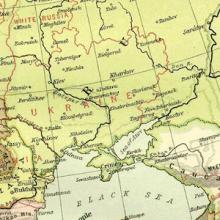
Long Teaching Module: Border Changes of the Soviet Union
Border changes have been a central part of 20th century European history. This lesson will examine a few key maps and documents that explore the creation, expansion, and dissolution of the Soviet Union. The Soviet Union arose from the First World War, was expanded by the Second World War, and was destroyed by the Cold War.
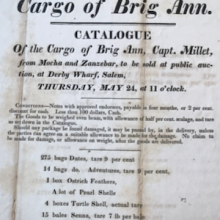
Short Teaching Module: Nineteenth-Century American Trade on Zanzibar
Although American merchants often fade from historical narratives after the eighteenth century, they remained influential actors in the United States and abroad. As western expansion and industrialization reshaped the nation’s economy, American traders dispatched voyages around the world in search of new opportunities.
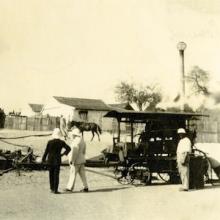
Short Teaching Module: Transnational Efforts at Controlling Yellow Fever
Early twentieth century microbiologists thought of their work as inherently transnational, and world historians have begun to do the same. The West African yellow fever epidemic of 1927-28 offers an exemplary opportunity to study how French scientists and African politicians used imperial and international networks to reimagine colonial public health policies.

Short Teaching Module: Global Approaches to Maritime Trade in Colonial North America
Traditional narratives in American history, especially in colonial history, tend to focus primarily on British policy and British trade networks. Taking a global approach to the maritime trade of British America in the colonial era provides a better understanding of the actual economy, however.
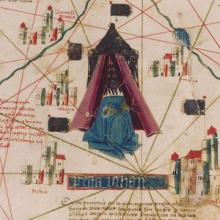
Short Teaching Module: Examining Early Genoese Voyages through Maps
The medieval Genoese ranged from China to the Atlantic, and their experience in navigation, the sugar industry, and the slave trade were the elemental foundation of Iberian colonial expansion.
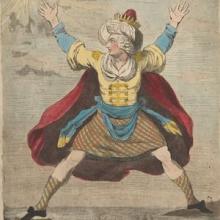
Short Teaching Module: Making Empire Global - British Imperialism in India, 1750-1800
The study of world history has often overlapped with scholarship on empire and imperialism. The global interactions engendered by empire have given rise to lively debate and even controversy about the nature of imperialism, its economic and political underpinnings as well as its impact on states, societies, and ecologies.
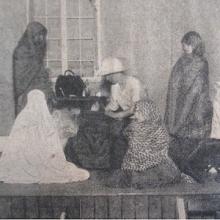
Long Teaching Module: Exploring Empire through the Lens of Childhood and Gender
As European empires expanded at the end of the end of the nineteenth century, imperialism came to permeate everyday life and had a pervasive influence on childhood, shaping everything from education to sports and literature.
Short Teaching Module: Ariya Cam Bini, a 19th century Cham Poem
Ariya Cam Bini is a 19th–century epic poem written in the Austronesian Cham language of mainland Southeast Asia. The poem comes from the area called Pāṇḍuraṅga or Nâgar Cam, a pluralistic society in terms of culture, religion, and identity.
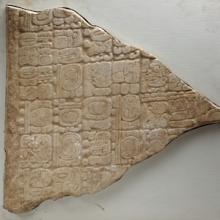
Short Teaching Module: Maya Writing
In the period from 200 to 900 C.E, which scholars later labelled the Classic Period, the Maya developed the most complex writing system in the Americas, a script with nearly a thousand characters (termed “glyphs”) that represent concepts and sounds, which over the last fifty years has been largely deciphered.
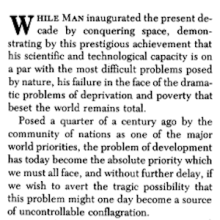
Short Teaching Module: The Nonaligned Movement and Cold War Détente
Since the early Cold War, neutral and nonaligned countries sought to overcome the division imposed by bipolar order.

Short Teaching Module: Precolonial Kenya, a Small-Scale History
World historians like to focus on large-scale interactions between different regions of the globe.

Short Teaching Module: History of the Pacific Ocean
Scholars of Pacific history explore how people build lives dependent on the ocean, how maritime connections create communities, and how humans and the environment shape each other. As a subfield of oceanic history, the Pacific offers a particularly rich setting for studying intersections between the local and global, and for charting postcolonial futures.

Short Teaching Module: Business History and Multilocal Approaches to World History
Globalization has meant not only greater cultural homogenization than ever before, but also growing multiculturalism, fostering many opportunities for cultural
Source Collection: Analyzing Treaties between the Iroquois Confederacy and the English Colonies in the 18th Century
During the 18th century, interactions between native peoples and Europeans were a regular occurrence not just along the colonial frontiers, but in French, English, and Spanish cities across the continent. One of the most powerful Native American nations in the north was the Iroquois Confederacy, or Six Nations.
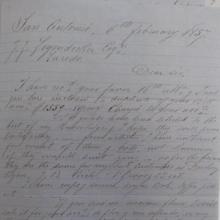
Short Teaching Module: Connecting Local and Global History via Mercantile Networks
European merchants spread throughout the world seeking new markets. In doing so, they actively connected remote localities to global networks across multiple continents. Local people around the world often challenged European economic dominance, forcing European merchants to pursue accommodating relationships with local people.

Short Teaching Module: Using Ships as Guides for Transnational Adventures through World History
Ships travel across oceans and in doing so connect people in disparate places across the globe. In this essay, Brandon Tachco explains how a focus on ships as a theme can add much to the study of world history. As "in between" places like ships are transnational by definition and they provide engaging sources for students to study.

Short Teaching Module: Premodern Chinese Maps and the Global Maritime World
Premodern Chinese maps offer fascinating sources for teachers and students of world history. As historian Elke Papelitzky explains, these maps can reveal much about the world view of the mapmakers and their audience in China and they also serve as example of how knowledge and skills spread from region to region in the period.
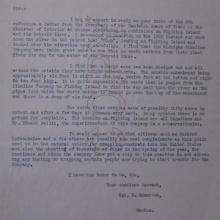
Short Teaching Module: Shared Space, Shared Experiences: Transnational Water Management around the Great Lakes
World historians sometimes work within a single sub-field, such as migration history or gender history, but they can also bring sub-fields together, as their perspectives, methods, and subject matter cross boundaries.

Long Teaching Module: Masculinity and Femininity in the Mongol Empire
This module examines ideals of masculinity and femininity among the Mongols, the Central Asian nomadic pastoralists who in the thirteenth century under their leader Chinggis Khan created the largest land-based empire the world has ever seen.
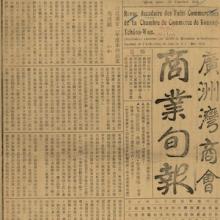
Short Teaching Module: Colonialism and Local Power
Colonialism and imperialism can take many forms, but more often than not these do not entail direct and strict control from a distant imperial metropole.